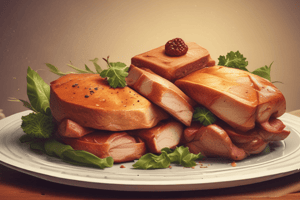Podcast
Questions and Answers
What is one of the first steps in the food presentation process?
What is one of the first steps in the food presentation process?
- Choosing the right plate for the meal (correct)
- Arranging the food items into a specific shape
- Deciding on the portion size
- Selecting the right colors for the food
What color plate is generally considered to increase appetite?
What color plate is generally considered to increase appetite?
- Green
- Red (correct)
- Blue
- Yellow
How does the use of dark plates affect the presentation of light-colored dishes?
How does the use of dark plates affect the presentation of light-colored dishes?
- They create a bland visual experience
- They make the dishes look less appetizing
- They enhance the aesthetic appeal of the dishes (correct)
- They make the dishes appear larger
Which phrase best conceptualizes food plating?
Which phrase best conceptualizes food plating?
Why are white plates commonly preferred for food presentation?
Why are white plates commonly preferred for food presentation?
What effect does the color blue have on the appetite according to professional platers?
What effect does the color blue have on the appetite according to professional platers?
Which rule is suggested for food arrangement on the plate?
Which rule is suggested for food arrangement on the plate?
What should be kept in mind when selecting plate size for food presentation?
What should be kept in mind when selecting plate size for food presentation?
What is an important aspect of food arrangement that refers to placing the focal point of a dish to the left or right side of the plate?
What is an important aspect of food arrangement that refers to placing the focal point of a dish to the left or right side of the plate?
When arranging food, which technique emphasizes creating a balanced visual landscape by adjusting the placement of items with varying heights?
When arranging food, which technique emphasizes creating a balanced visual landscape by adjusting the placement of items with varying heights?
Which food arrangement technique suggests plating moist ingredients first to control their spread?
Which food arrangement technique suggests plating moist ingredients first to control their spread?
What is the benefit of serving odd quantities of small foods like appetizers?
What is the benefit of serving odd quantities of small foods like appetizers?
How can the use of color diversity in plating enhance a dish?
How can the use of color diversity in plating enhance a dish?
What technique involves creating forkfuls of food that combine all ingredients into one bite?
What technique involves creating forkfuls of food that combine all ingredients into one bite?
Plating items in a monochromatic fashion suggests what about the dish's flavor profile?
Plating items in a monochromatic fashion suggests what about the dish's flavor profile?
Which visual plating technique adds intrigue by layering food items?
Which visual plating technique adds intrigue by layering food items?
How does 'not overcrowding' the plate affect the aesthetic of the meal?
How does 'not overcrowding' the plate affect the aesthetic of the meal?
How should vegetables be arranged visually in relation to other elements on the plate?
How should vegetables be arranged visually in relation to other elements on the plate?
Flashcards are hidden until you start studying
Study Notes
Food Plating Techniques
- Food plating enhances aesthetic appeal through arrangement and decoration.
- No fixed rules, but fundamental concepts guide effective presentation.
Plate Presentation Techniques
- Selecting the Right Plate: Consider size, color, and style when choosing.
- Plate Size: Should be spacious enough for food visibility yet not too large to diminish portion sizes.
- Light vs Dark Plates: Brightly colored foods pop on white plates, while dark plates highlight lighter dishes.
- Plate Color Psychology: Red stimulates appetite; avoid blue as it is considered unappetizing.
- Restaurant Style: Match plate choice with the dining experience, classic for fine dining, unique for casual eateries.
Food Arrangement Techniques
- Rule of Thirds: Place focal food to the side of the plate rather than the center.
- Plate Clock Visualization: Position protein between 3-9, starch from 9-12, and vegetables from 12-3.
- Avoid Overcrowding: Simplify presentation; focus on one highlight food item.
- Moist Ingredients First: Start with moist items to prevent drips; layer other foods carefully.
- Create Flavor Bites: Encourage bites that mix elements for a fuller sensory experience.
- Mix Textures: Combine smooth and crunchy elements for appealing contrasts.
Visual Plating Techniques
- Serve Odd Quantities: Present appetizers or small items in odd numbers for visual interest.
- Color Diversity: Use a variety of colors to create vibrancy and attract attention.
- Monochromatic Meals: Present color-coded items to mislead expectations for enhanced taste engagement.
- Add Height: Build layers on the plate for dynamic exploration rather than flat arrangements.
- Visual Balance: Lean longer items against shorter components for a harmonious presentation.
Sauce Plating Techniques
- Use Sauce Creatively: Think of sauce as paint; apply it artistically to enhance overall presentation.
- Sauce Application: Consider techniques such as drizzling, pooling, or designing patterns for visual impact.
Studying That Suits You
Use AI to generate personalized quizzes and flashcards to suit your learning preferences.




